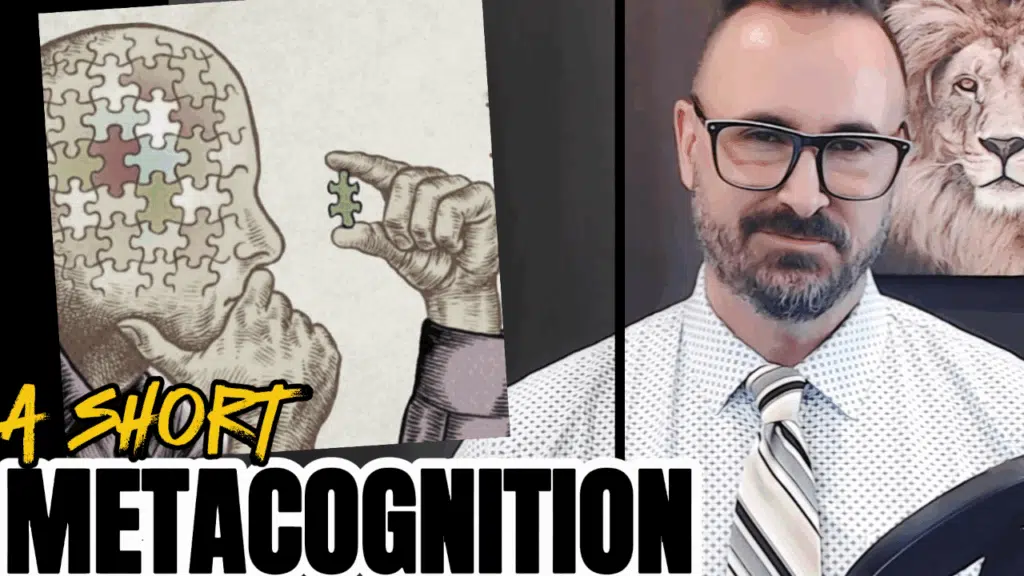
Become a Master of Metacognition | YouTube
The hardest part about waking up isn’t the trauma triggered by some newly inescapable cognitive dissonance.
It’s the humility it takes to admit that all the shaming we did to other people was not only wrong, but directed at the wrong source.
It’s easy to rage against corruption, betrayal, or manipulation in the world—once we’ve seen it. But what about the long season when we didn’t see it? Or didn’t want to? What about when we dismissed someone else’s clarity because it made our cognition and comforts wobble? That’s the part we skip. That’s the part no one wants to revisit.
But we should.
Because it teaches us the most vital skill in this age of narrative war: metacognition.
A portion of my most recent video lesson in the US HIST & CATH course uses material from someone I would likely disagree with, and I did it to provide an extreme example of the importance of doing a self-check every day.
Metacognition isn’t just thinking. It’s thinking about how we think. It’s self-checking. Self-auditing.
It’s soul-searching.
It’s not a trendy term for over-intellectualized underqualified therapists—it’s a spiritual and mental discipline we desperately need if we’re going to live in a world where psyops are daily bread and meaning is constantly up for debate.
The article “Test Your Sanity Every Day” from Chris Paul makes the case well. I invite you to read it in full, but here’s just a piece:
We have been intentionally deceived throughout our lives about every single aspect of our existence. Our governments were hired to manage us. The News is just some story or rumor or advertisement. Our elections are fake. Our doctors are drug dealers who make us sicker for profit. Our legal system is designed specifically to exploit us. Our allies and enemies have been misidentified. It’s all upside down.
There are people who think that what I just said crazy. As a person who gets disagreed with quite often, it’s crucial to be constantly checking whether I might be the crazy one. Though mainstream consensus is overwhelmingly produced by manipulation and conditioning, not every consensus is. I might be the crazy one, but the person calling me crazy might be the crazy one. It’s us or them.
I proceed to take inventory of my rationale, premises, mood etc… and trying to resolve every possible conflict with them that might be raised. If something is off, then the problem is probably mine. It’s impossible to be perfect in reconciling for worldly accuracy and I am certainly not perfect, but progress can be made and we can improve our ability to deeply examine the structure of our own beliefs. It’s good to check ourselves against the things of the world, things that are entirely human but, once done, it cannot be all we would do.
In the Inversion, it’s entirely possible to believe everything is actually its opposite, to check every worldly box for accuracy and, despite reconciling, still be the crazy one. That means that checking our facts and our sources for accuracy is not sufficient to disprove insanity. If we think it is sufficient, then we are insane.
Some of you may remember the Dickinson poem “Much Madness is Divinest Sense.”
Much Madness is divinest Sense –
To a discerning Eye –
Much Sense – the starkest Madness –
’Tis the Majority
In this, as all, prevail –
Assent – and you are sane –
Demur – you’re straightway dangerous –
And handled with a Chain –
—
If you’re not checking your worldview against reality—if you’re not actively inspecting the stories you’ve internalized—someone else is doing that work for you. And that someone likely doesn’t have your eternal soul in mind.
I’ve tried to model this in my own work. Not perfectly. But sincerely.
I ask questions not just of the powerful, but of the public.
I ask questions about Donald Trump.
I try to show the cracks not only in the stories we’re being told, but in the trust structures we’ve built around those stories.
And I try to ask these questions out loud, so others can see a model to do the same.
Because the Epstein list? The JFK files? 9/11? COVID everything?
George Bush?
Barack Obama?
None of that means anything if we don’t ask how we ever believed the opposite in the first place.
Metacognition is the art of asking myself, ourselves, a series of questions.
Who taught me to think this way?
What assumptions am I still carrying?
What voices am I afraid to hear—and why?
My practice is to train my thoughts under obedience to Christ—not culture.
Not Donald Trump, regardless of whether or not I voted for him.
And that’s our challenge now.
Because the culture is and has long been splintered into a billion pieces.
The narratives are competing for our attention and trust.
And the spiritual stakes are higher than most even realize.
So become that master of the metacognitive.
Test your sanity.
Inspect your long-cherished frameworks.
Challenge your own undying comfort.
If you don’t, the regime will do it for you. And it won’t do it nicely.



